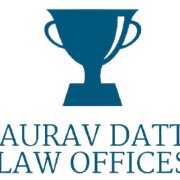Best Art & Cultural Property Law Lawyers in Chandigarh
Share your needs with us, get contacted by law firms.
Free. Takes 2 min.
List of the best lawyers in Chandigarh, India
About Art & Cultural Property Law in Chandigarh, India
Art & Cultural Property Law in Chandigarh encompasses legal principles and regulations designed to protect cultural heritage, works of art, and historical artefacts within the region. This field of law involves issues related to the ownership, distribution, preservation, and repatriation of cultural property. Chandigarh, known for its distinct cultural identity and heritage, adheres to both national and regional legal frameworks to safeguard its art and cultural assets. While central to this field are statutes such as the Antiquities and Art Treasures Act, 1972, local adaptations and enforcement are crucial to addressing region-specific challenges.
Why You May Need a Lawyer
There are several common situations where individuals or organizations may require legal assistance in the field of Art & Cultural Property Law in Chandigarh. These may include:
- Dispute over the ownership of art or cultural property
- Transferring ownership or lending cultural artefacts
- Compliance with local and national laws on the export or import of art
- Dealing with counterfeit or stolen cultural items
- Preservation and conservation of cultural heritage sites
- Navigating legal issues surrounding the cultural heritage of indigenous peoples
In each of these scenarios, a legal expert can provide valuable advice and representation to ensure adherence to legal standards and the protection of cultural heritage.
Local Laws Overview
Chandigarh follows a combination of national and regional regulations concerning Art & Cultural Property Law. Key aspects include:
- The Antiquities and Art Treasures Act, 1972, which regulates the export of antiquities and art treasures and provides for the prevention of smuggling and fraudulent dealings in antiques.
- The Indian Treasure Trove Act, 1878, which addresses the discovery of treasure in the ground or subsoil and requires proper reporting and documentation to preserve such finds.
- Chandigarh's cultural policy focuses on promoting artistic endeavors while safeguarding its cultural heritage, influencing local ordinances and cultural preservation efforts.
- Collaboration with international treaties, like the UNESCO Convention on the Means of Prohibiting and Preventing the Illicit Import, Export, and Transfer of Ownership of Cultural Property, which India is a party to, further strengthens legal measures.
Frequently Asked Questions
What constitutes cultural property?
Cultural property includes artefacts, monuments, artworks, manuscripts, and other objects of historical, artistic, scientific, or religious significance.
How is ownership of art and artefacts determined?
Ownership is usually established through documentation such as purchase receipts, provenance records, and legal titles. Disputes may require additional legal intervention.
What should I do if I find an antique or treasure?
Under the Indian Treasure Trove Act, 1878, you must report any such discoveries to the local authorities to comply with legal requirements and ensure proper preservation.
Can art be freely exported from Chandigarh?
Exporting art may require compliance with national regulations, including obtaining permits under the Antiquities and Art Treasures Act, 1972, particularly for objects over a specific age or of particular cultural significance.
What legal protections are there against art forgery?
Forgery and fraud in art are addressed under the Indian Penal Code, alongside specific cultural property laws aimed at ensuring authenticity and provenance.
How does repatriation of cultural property work?
Repatriation involves the return of cultural property to its country or community of origin, often governed by international treaties and local agreements between states.
Are there specific laws for indigenous cultural heritage?
India has policies aimed at protecting the cultural heritage of indigenous peoples, ensuring that their cultural expressions and artifacts are preserved and respected.
Who regulates art sales in Chandigarh?
Art sales are overseen by legal frameworks that include consumer protection laws and specific regulations related to cultural property transactions to prevent fraud and illicit trade.
What legal remedies are available for art theft?
Victims of art theft can seek legal recourse through criminal charges against the perpetrators and civil suits for recovery and damages.
Where can I seek authentication for artworks?
Professional art appraisers and authentication services can provide the necessary expertise to establish authenticity and provenance, often required for legal proceedings.
Additional Resources
For further assistance and information on Art & Cultural Property Law in Chandigarh, consider the following resources:
- The Ministry of Culture, Government of India, for policy details and legal frameworks
- The Archaeological Survey of India, which oversees the preservation of cultural heritage
- Local heritage conservation bodies and cultural organizations
- Legal aid services and Bar associations in Chandigarh focusing on art and property law
Next Steps
If you require legal assistance in Art & Cultural Property Law in Chandigarh, it is advisable to seek the expertise of a lawyer specializing in this field. You can:
- Contact specialist law firms or legal practitioners in Chandigarh with expertise in heritage and art law.
- Use online directories or local Bar association listings to find qualified lawyers.
- Schedule consultations to discuss your situation and receive specific legal advice tailored to your needs.
By taking these steps, you can ensure that your interests and rights concerning art and cultural property are well-protected and legally compliant.
Lawzana helps you find the best lawyers and law firms in Chandigarh through a curated and pre-screened list of qualified legal professionals. Our platform offers rankings and detailed profiles of attorneys and law firms, allowing you to compare based on practice areas, including Art & Cultural Property Law, experience, and client feedback.
Each profile includes a description of the firm's areas of practice, client reviews, team members and partners, year of establishment, spoken languages, office locations, contact information, social media presence, and any published articles or resources. Most firms on our platform speak English and are experienced in both local and international legal matters.
Get a quote from top-rated law firms in Chandigarh, India — quickly, securely, and without unnecessary hassle.
Disclaimer:
The information provided on this page is for general informational purposes only and does not constitute legal advice. While we strive to ensure the accuracy and relevance of the content, legal information may change over time, and interpretations of the law can vary. You should always consult with a qualified legal professional for advice specific to your situation.
We disclaim all liability for actions taken or not taken based on the content of this page. If you believe any information is incorrect or outdated, please contact us, and we will review and update it where appropriate.











